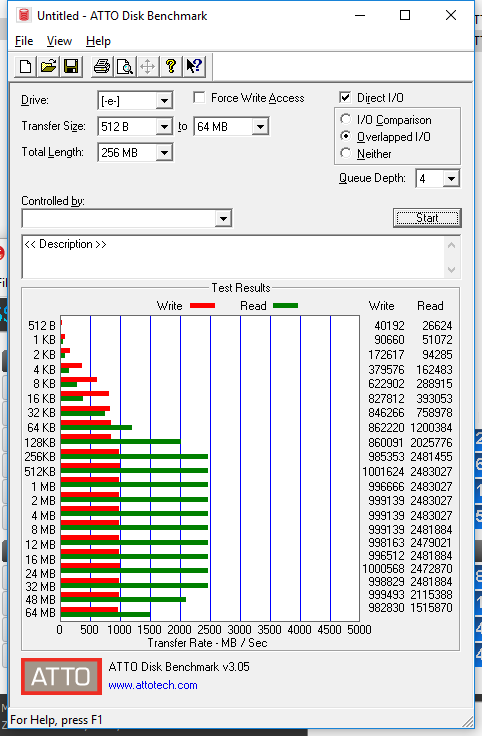ATTO Disk Benchmark is perhaps one of the oldest benchmarks going and is definitely the main staple for manufacturer performance specifications. ATTO uses RAW or compressible data and, for our benchmarks, we use a set length of 256mb and test both the read and write performance of various transfer sizes ranging from 0.5 to 8192kb. Manufacturers prefer this method of testing as it deals with raw (compressible) data rather than random (includes incompressible data) which, although more realistic, results in lower performance results.
Our initial results for the M8Se show that it easily meets the rated specs of 2450MB/s for read and 1GB/s for write. However, at the smaller file sizes, the M8Se is slightly slower than other SSDs we have recently tested. Let’s move on to some other tests to see if this continues to hold true.
CRYSTAL DISK BENCHMARK VER. 5.2.1 X64
Crystal Disk Benchmark is used to measure read and write performance through sampling of random data which is, for the most part, incompressible. Performance is virtually identical, regardless of data sample so we have included only that using random data samples.
In Crystal Disk Mark, it seems to have improved quite a bit. Sequential performance is on par with what Plextor states and 4K QD1 performance is very good. 4K DQ1 read performance is even better than that of the Samsung 960 EVO, which is one of the fastest NVMe SSDs out!
The toughest benchmark available for solid state drives is AS SSD as it relies solely on incompressible data samples when testing performance. For the most part, AS SSD tests can be considered the ‘worst case scenario’ in obtaining data transfer speeds and many enthusiasts like AS SSD for their needs. Transfer speeds are displayed on the left with IOPS results on the right.
In our next benchmark, AS SSD, the Plextor M8Se was able to score 2641 points overall. The sequential performance came in at nearly 2.2GB/s for read and 936MB/s for write. 4KQD1 performance, again, is very good, but what is better is its higher QD IOPS performance. Here it reached nearly 270K IOPS read! This is much better than the rating of 210K IOPS, but the write result wasn’t quite as good at just 117K IOPS. During the copy test it averaged very good results with 1.6GB/s being the highest in the ISO test.
ANVIL STORAGE UTILITIES PROFESSIONAL
Anvil’s Storage Utilities (ASU) are the most complete test bed available for the solid state drive today. The benchmark displays test results for, not only throughput but also, IOPS and Disk Access Times. Not only does it have a preset SSD benchmark, but also, it has included such things as endurance testing and threaded I/O read, write and mixed tests, all of which are very simple to understand and use in our benchmark testing.
For our last non-trace based benchmark, Anvil Storage Utilities, the M8Se did well. Overall it achieved a score of 9719 points. Most performance metrics are similar to what we had seen previously, but this time around it was able to achieve nearly 170K IOPS write performance. This is very close to the rating of 175K, which is good to see.
 The SSD Review The Worlds Dedicated SSD Education and Review Resource |
The SSD Review The Worlds Dedicated SSD Education and Review Resource | 


Curious as to why the read performance in the ATTO benchmark drops off at the highest queue depths.
probably cause the heat